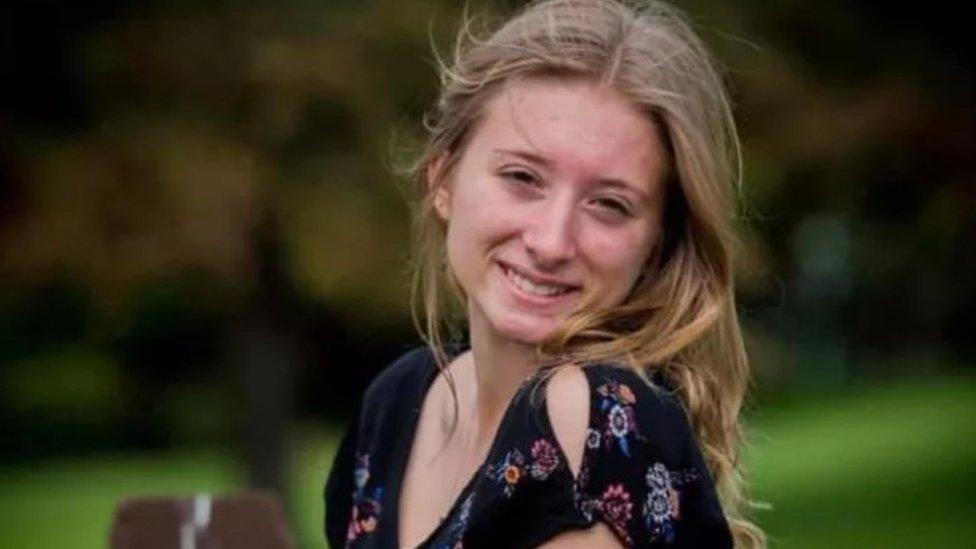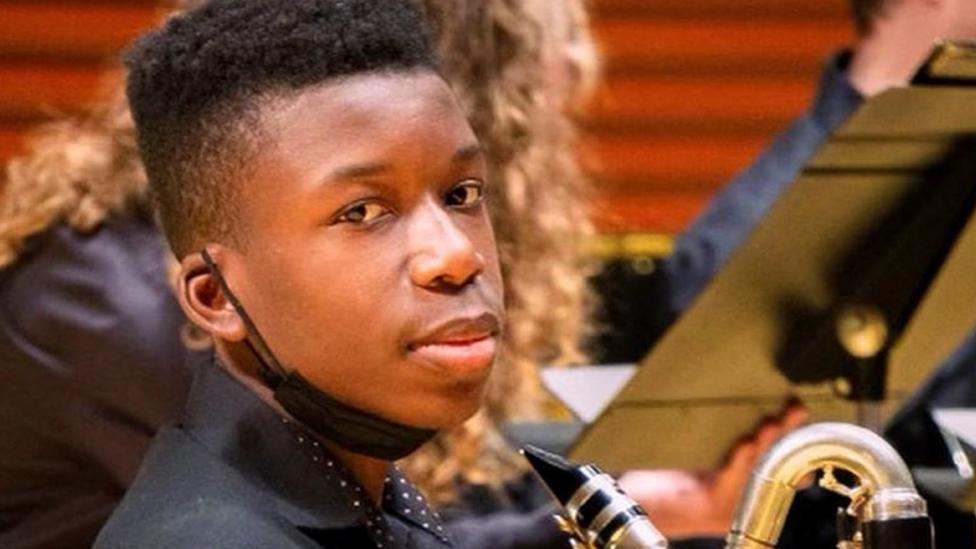What is a stand your ground law and which states have one?
- Published

Ralph Yarl survived being shot after approaching the wrong house in Missouri
Two recent cases of unarmed people being shot and killed in the US have renewed discussion of so-called "stand your ground" laws.
In the past week, 16-year-old Ralph Yarl was shot twice after ringing the doorbell of the wrong home and 20-year-old Kaylin Gillis died after being shot upon entering the wrong driveway.
The shootings have prompted questions about a person's rights to protect themselves and their property in the US - and when a person can use deadly force in self defence.
The answer depends on where you live.
What is a stand your ground law?
A stand your ground law is enacted at state level and most of these permit an individual to protect themselves with the use of reasonable force, including deadly force, to prevent death or great bodily harm.
Stand your ground laws echo the common law "castle doctrine" principle, which does not carry a "duty to retreat" when a person feels they must defend their home.
The duty to retreat, or an obligation to step back and avoid confrontation where possible, is removed under most stand your ground laws, dubbed "shoot first" laws by critics.
The laws began to appear in states after a bill featuring the language "has the right to stand his or her ground" was introduced in Florida in 2005.
When defendants use a stand your ground law to defend their actions, often the case centres on whether or not their use of force meets the standard for "reasonable", given the perceived threat.
Some laws refer to "deadly force", defined as the amount of force which a reasonable person would deem likely to cause death, or serious bodily harm, to another person, according to Cornell University.
How many states have stand your ground laws?
Versions of stand your ground laws are in effect in at least 28 states, external - including Missouri where Ralph Yarl was shot - and Puerto Rico.
The states include: Alabama, Alaska, Arizona, Arkansas, Florida, Georgia, Idaho, Indiana, Iowa, Kansas, Kentucky, Louisiana, Michigan, Mississippi, Missouri, Montana, Nevada, New Hampshire, North Carolina, North Dakota, Ohio, Oklahoma, Pennsylvania, South Carolina, South Dakota, Tennessee, Texas, Utah and West Virginia Wyoming.
In these states, there is no duty to retreat from an attacker.
In Missouri, a person does not have a duty to retreat from their private property. An 84-year-old man has been charged first-degree assault and armed criminal action over Ralph Yarl's shooting.
Eight other states - California, Colorado, Illinois, New Mexico, Oregon, Virginia, Vermont and Washington - permit the use of deadly force in self defence.
New York state, where Ms Gillis was shot as the car she was in pulled into the wrong driveway, does not have a stand your ground law, and imposes a broad duty to retreat.
But its state law also introduces the castle doctrine in certain circumstances. A man has been charged with second-degree murder over the Ms Gillis' death.
The impact of stand your ground laws
Statistics show that states with stand your ground laws have seen a rise in homicides by 10% or higher, external.
John Roman, director of the Center on Public Safety and Justice at NORC at the University of Chicago, authored a study examining 53,019 cases involving stand your ground laws.
He told the BBC that they "promote violence".
"People feel like they have an added protection that makes them more likely to shoot where they wouldn't have shot without that perceived protection," he said.
It also "tragically" increases racial disparities in the US criminal justice system, he said.
Data from the report, external showed that, when the shooter is white and the victim is black, the white shooter is 10 times more likely to have their actions deemed justified than when the shooter is black and the victim is white.
The study found that, in cases where stand your ground laws featured, 11.4% of white-on-black homicides were ruled as justified, compared to just 1.2% of black-on-white homicides.
Well-known cases related to stand your ground
The death of unarmed 17-year-old Trayvon Martin in Florida in 2012 thrust conversations around the principle behind stand your ground into the national spotlight.
Lawyers for neighbourhood watchman George Zimmerman, 29, said he acted in self-defence with justifiable use of deadly force. He was acquitted of all charges.
The case sparked a fierce debate about racial profiling in the US and spontaneous protest marches were staged overnight in cities such as San Francisco, Philadelphia, Chicago, Washington DC and Atlanta.
In another prominent case, Ahmaud Arbery, a 25-year-old black male, was fatally gunned down by three white men while jogging through a Georgia neighbourhood, unarmed. The men tried to justify their actions by citing stand your ground laws.
However, they were unsuccessful and were convicted of felony murder among other charges.
Related topics
- Published19 April 2023

- Published18 April 2023

- Published17 December 2024
